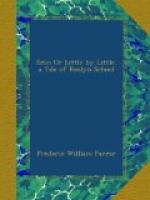“Is he? I’m delighted to hear it.”
“Yes. He had a ‘mauvais sujet’ to defend the other day, in the person of our old enemy, Brigson, who, having been at last disowned by his relations, is at present a policeman in London.”
“On the principle, I suppose, of ‘Set a thief to catch a thief,’” said Montagu, with a smile.
“Yes; but he exemplifies the truth ’chassez le naturel, il revient au galop’ for he was charged with abetting a street fight between two boys, which very nearly ended fatally. However, he was penitent, and Graham got him off with wonderful cleverness.”
“Ah!” said Montagu, sighing, “there was one who would have been the pride of Roslyn had he lived Poor, poor Eric!”
We talked long of our loved friend; his bright face, his winning words, his merry smile, came back to us with the memory of his melancholy fate, and a deep sadness fell over us.
“Poor boy, he is at peace now,” said Montagu; and he told me once more the sorrowful particulars of his death. “Shall I read you some verses?” he asked, “which he must have composed, poor fellow, on board the ‘Stormy Petrel,’ though he probably wrote them at Fairholm afterwards.”
“Yes, do.”
And Montagu, in his pleasant musical voice, read me, with much feeling, these lines, written in Eric’s boyish hand, and signed with his name.
ALONE, YET NOT ALONE.
Alone, alone! ah, weary
soul,
In all the
world alone I stand,
With none to wed their
hearts to mine,
Or link
in mine a loving hand.
Ah! I tell me not
that I have those
Who owe
the ties of blood and name,
Or pitying friends who
love me well,
And dear
returns of friendship claim.
I have, I have! but
none can heal,
And none
shall see my inward woe,
And the deep thoughts
within me veiled
No other
heart but mine shall know.
And yet amid my sins
and shames
The shield
of God is o’er me thrown
And, ’neath its
awful shade I feel
Alone,—yet,
ah, not all alone!
Not all alone! and though
my life
Be dragged
along the stained earth,
O God! I feel thee
near me still,
And thank
thee for my birth!
E.W.
Montagu gave me the paper, and I cherish it as my dearest memorial of my erring but noble schoolboy friend.
Knowing how strong an interest Mr. Rose always took in Eric, I gave him a copy of these verses when last I visited him at his pleasant vicarage of Seaford, to which he was presented a year or two ago by Dr. Rowlands, now Bishop of Roslyn, who has also appointed him examining chaplain. I sat and watched Mr. Rose while he read them. A mournful interest was depicted on his face, his hand trembled a little, and I fancied that he bent his grey hair over the paper to hide a tear. We always knew at school that




